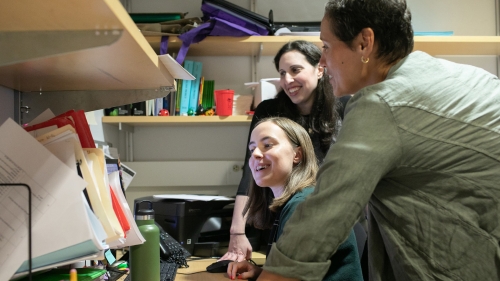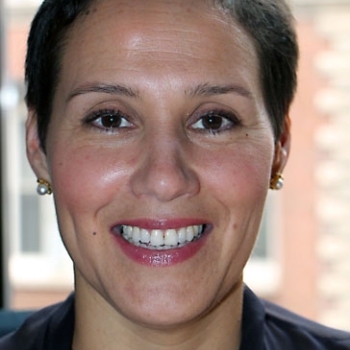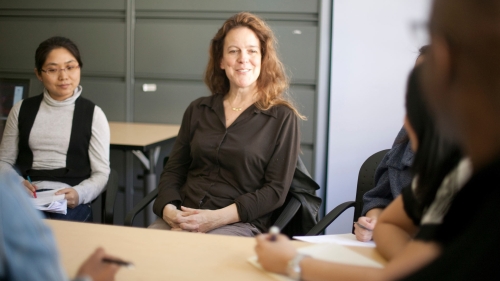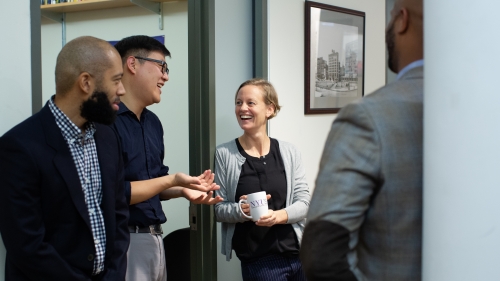

Gigliana Melzi is Professor of Applied Psychology, Affiliated Faculty at the Center for Latin American and Caribbean Studies, and of the Latinx Project at New York University. She is also the Director of the Culture, Families, and Early Development Lab.
Dr. Melzi was born and raised in Lima, Peru. She came to the United States to pursue her undergraduate degree at Clark University, where she double-majored in Spanish Literature and Psychology. She continued her studies in developmental psychology, focusing on language development, at Boston University, where she obtained her PhD.
Dr. Melzi’s work focuses on the intersection of cultural and linguistic practices and their relation to children’s early development and learning, in particular that of dual-language learners from immigrant Latine/x communities. Using mixed-methodology and emic approaches, Dr. Melzi's work investigates how Latine/x immigrant families support their children's learning, the role language plays in that process, and how the educational system can leverage these practices to support children’s school-based learning. Her work adopts a collaborative research stance, working in partnership with Latine/x communities and educational centers serving Latine/x families. In her most recent work as part of a cross-university effort to enhance the Development and Research in Early Math Education (DREME) network, Dr. Melzi is investigating the everyday family math talk in Spanish-speaking and Spanish-English bilingual immigrant homes of preschool aged children. In her newest project, Dr. Melzi and her collaborators, Dr. Callanan from UC Santa Cruz and Dr. Haden from Loyola University, examine the role of oral and written stories in supporting young Latine/x preschoolers early science practices.
Dr. Melzi's work has been published in top developmental psychology and language & linguistics journals, including Child Development, Developmental Psychology, Annual Review of Applied Linguistics, Journal of Child Language, as well as practice-oriented journals, such as Bank Street Occasional Papers. Her work has been funded by private foundations, including the Spencer Foundation, the Brady Educational Foundation and the Heising-Simons Foundation, as well as by federal agencies, including National Institute of Health, The U.S. Department of Health and Human Services, Administration for Children and Families, and The National Science Foundation.
Selected Publications
- McWayne, C. & Melzi, G. (2023) Young children co‐constructing science: The importance of their families and cultural communities. Science Education.
- Schick, A.R., Wuest, C., Lim, R. Melzi, G. (2023). Supporting Preschool Teachers’ Use of Culturally Grounded Practices: Factors that Influence Program Fidelity. Journal of Early Childhood Teacher Education.
- Haden, C. A., Melzi, G., & Callanan, M. (2023). Science in stories: Implications for Latine Children's science learning through home-based language practices. Special Issue on Informal STEM learning at Home and Community Spaces, Frontiers in Psychology, 14.
- Caspe, M., Melzi, G., Mesalles, V., Prishker, N. & Alvarado, C. (2023). Latine caregivers’ approaches to engaging young children in mathematics. Early Childhood Research Quarterly.
- Clark Whitney, E. & Melzi, G. (2023). Executive function and narrative language abilities in bilingual preschoolers. Language, Speech, and Hearing Services in Schools.
- Halpin, E., *Prishker, N, & Melzi, G. (2023). The language diversity and science readiness skills of Latino preschoolers. Language, Speech, and Hearing Services in Schools.
- McWayne, C., Melzi, G., Mistry, J. (2022). A home-to-school approach for promoting culturally inclusive family-school partnership research and practice. Educational Psychologist, 57, 283-251.
- Melzi, G., *Mesalles V., Caspe, M., *Prishker, N. (2022). Spatial Language during a household task with bilingual Latine families. Journal of Applied Developmental Psychology, 80, 1-12.
- Melzi, G., Schick, A.R., Wuest, C. (2022). Stories beyond books: Preschool teachers’ use of oral stories supports children’s early literacy skills. Early Education and Development, 1-21.
- Melzi, G., McWayne, C., Prishker, N., & Wisnia, J. (2021). Por los niños: Latine caregivers’ reflections on parenting. Journal of Latinos & Education, 1-20
- Halpin, E., Prishker, N, & Melzi, G. (2021). The Bilingual Language Diversity of Latino Preschoolers: A Latent Profile Analysis. Language, Speech, and Hearing Services in Schools, 1-12.
- Melzi, G., McWayne, C., & Ochoa, W. (2020). Family engagement and Latine children’s narrative skills. Early Childhood Education Journal.
- Melzi, G. Schick, A., & Scarola, L. (2018). Building Bridges between Home and School for Latinx Families of Preschool Children J.K. Adair & F. Doucet, (Eds.) Supporting Young Children of Immigrants in PreK-3 [Special Issue]. Bank Street Occasional Papers Series, 39, 1-20.
- Halpin, E., & Melzi, G. (2018). Code-switching in the narratives of dual-language Latino preschoolers. International Journal of Bilingual Education and Bilingualism, 1-17.
- McWayne, C., Foster, B., & Melzi, G. (2018). Culturally embedded measurement of low-Income Latino caregivers’ engagement in preschool: A tale of two forms of engagement. Early Education & Development.


